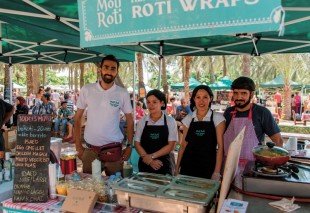

Case study: Catering for community

A home-grown Pakistani brand, Moti Roti, regularly caters to local events such as the Ripe Food Market and the Fridge Concert series, among others. We investigate what the team does to be fully prepared
Moti Roti was founded in the UAE two years ago by Tahir Shah, and started off its journey in events catering, by participating in community fairs and markets. At the time, Shah says the idea of home-style rotis as wraps was new and untested, and “events were the perfect platform for us to get feedback”.
The brand began by catering at Emaar community fairs, and eventually established a reputation for itself, and soon began appearing at farmers’ markets and events for Dubai’s art and music community. Now, the ubiquitous rotis can be found every weekend at Ripe’s Food Market in Safa Park, Dubai.
Preparation Time
Shah says the team has learned over time what works for various events and what doesn’t, with a learning curve they had to face when starting out. He explains: “This has been a steady iteration of learning for us. In the early days I had a rudimentary checklist on my phone, and still we would run around because we would have forgotten something so innocuous such as matches.”
Now, however, the team has stepped up its game and has incorporated extra planning in their preparations.
Shah says: “Now we start planning the staffing a few days in advance, and start the ordering with the kitchen two days prior. All the staff members have Android tablets and we use Google Docs to share a checklist, which the team leader goes through and ticks.”
An event like Ripe’s market costs Shah AED 900 just for the setup, not including the cost of food involved on the day.
At the first market the team attended, Shah had just had a truck-style kiosk made. “Being made partly from reclaimed wood made it extremely heavy to carry, and I had to hire a pickup to transport it.
Since this was too impractical to move around, we needed a lighter stand; we took a spare steel kitchen bench on wheels, went to Al Quoz and improvised a fake wood casing, and tacked on a wheel from a wheel barrow to make it look like a hand cart.”
Article continues on next page ...
In Practice
On the day, Shah is present on-site, along with one chef, two counter staff, and the driver. While the fillings for the wraps are already cooked, the chef makes the rotis fresh, “from flour to fire” as Shah says. The team typically starts the day at 6.30am and finishes by 4pm. Team leader Anna Espenitra says while the experience is tiring and busy, it is an “enjoyable event”. She adds: “We are a startup, it’s good for my company.”
Shah expands on what to expect: “At events we are famous for our rotis since the bread is cooked live. While we also do our rice box, and salad box, the roti is by far the most popular.
“Typical fillings we offer are chicken masala, keema, and chickpeas, but also, at Ripe we offer the breakfast roti — not available elsewhere — which is a light masala omelette filling. Believe it or not, that one is my recipe. Plus we make the mango lassi fresh at the market.”
He admits that handling orders can be chaotic during peak hours, especially when customers are waiting for the rotis to be prepared fresh, and the queue gets bigger.
Shah says: “So I use my iPhone to take orders — this is great because everyone thinks I'm using a cool app, whereas I’m just using Notepad and writing: ‘dude in hat, two chicken wraps’.”
Feedback
Shah says after a growing number of customers expressed a desire for gluten-free options, the salad box and rice box were introduced.
But the spectacle of making the rotis live — Shah ensures they are made to order — is a big draw at various events. He explains: “We just about handle the queue, but quite honestly people seem happy to wait — the making of the roti is a huge draw. They see chef literally make it from scratch and the bread as it puffs up on a naked flame.”
Counter crew Ann Canonaso says the experience is amazing because “the feedback is always good, so as a staff member I am really happy to hear that. We enjoy interacting with all our customers; we meet different people and make sure they are satisfied and will come back.”
Shah has future plans for improving the stand. He admits that for the cart-like table, there isn’t the wow factor that the team gets with its truck-style stall. “However, for one of our outlets we’ve have had a tuk-tuk style pop-up shop made. This also is too heavy to transport, but we are going to modify the current table we use at events, and design a detachable tuk-tuk hood. It will be an attraction both for the public and event organisers.”
Shah concludes: “We kept on working hard and improving, and can proudly stand shoulder-to-shoulder with the big brands at events and draw as much of a crowd. To think that our small team can handle up to 250 orders every Friday at Ripe’s market is a proud feat for us.”